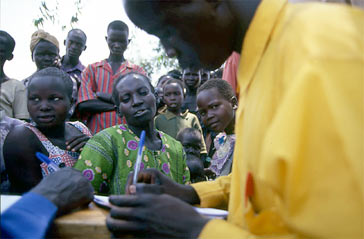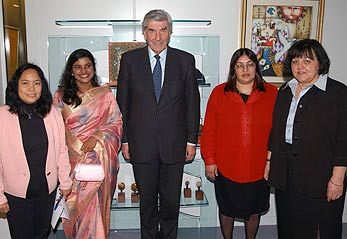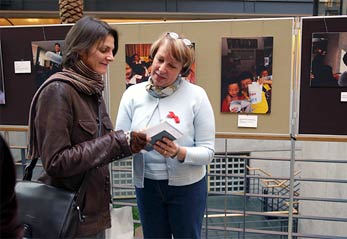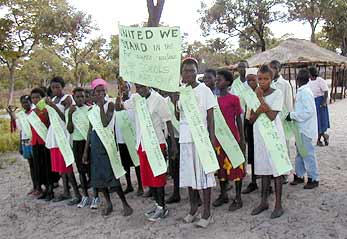UNHCR receives report on Nairobi investigation
UNHCR receives report on Nairobi investigation
GENEVA - High Commissioner Ruud Lubbers said today that UNHCR accepts the highly critical findings of an independent investigation the agency sought following allegations of corruption in the refugee resettlement process in its Nairobi, Kenya, office.
Lubbers said UNHCR, which first began looking into the allegations in Nairobi in mid-1999, was already taking remedial action to ensure the integrity of its refugee resettlement programmes in Kenya and worldwide.
A report on the investigation by the New York-based UN Office of Internal Oversight Services (OIOS) was released today. The 52-page report describes how a "criminal enterprise" allegedly infiltrated the refugee status determination and resettlement processes in Nairobi in the late 1990s to force bribes from people seeking resettlement to third countries.
Nine people, including three UNHCR staff, are currently facing a total of 78 charges under the Penal Code of Kenya in connection with the case. The charges include cheating, attempted cheating and forgery. More arrests may be made.
"I and thousands of other past and present UNHCR staff worldwide who have devoted their lives to helping refugees are both shamed and outraged by the despicable actions described in this report," Lubbers said. "There is no excuse, no defence, for such contemptible behaviour. Those who prey on poor and desperate refugees must be punished to the full extent of the law. And we in UNHCR must accept institutional responsibility for allowing an environment in which these activities could take place."
That environment eventually included direct threats to UNHCR staff who tried to help with the investigation. During the probe, five UNHCR staff members - including the then-country representative - had to be evacuated after receiving such threats.
Lubbers, who became High Commissioner in January 2001, said the OIOS report confirmed UNHCR's suspicions when it sought the OIOS investigation in late 2000.
"It shows that in an era of mass migration, global organized crime, human trafficking and smuggling, we are not immune to criminal infiltration," he said. "But I am particularly disturbed by the apparent management lapses - at various levels in UNHCR - which allowed an environment in which corruption could take root in Nairobi. So while the investigators have carried out their work over the past year, we in UNHCR have been focusing our attention on rectifying several internal structural and management concerns that may have together contributed to the emergence of this problem in the first place."
Remedial actions planned or already under way include:
- Changing all staff dealing with protection and resettlement in Nairobi, beginning in January 2001.
- Deployment of additional international protection staff on an emergency basis to Nairobi beginning in January 2001.
- Establishment beginning in January 2001 of supervisory panels to oversee decisions on resettlement cases involving family reunification and to review other resettlement cases and eligibility decisions.
- Establishment in February 2001 of a Transparency Committee made up of UNHCR protection staff, officers of embassies and high commissions of resettlement countries, NGOs, and civil society.
- Mandatory review by senior staff of all resettlement cases approved at the Nairobi Branch Office, along with random file checks.
- Frequent spot checks by UNHCR's security officer in Nairobi to ensure refugees and asylum seekers have unhindered access to the procedure.
- Completion of a comprehensive review of refugee documentation used in Kenya, with a recommendation for introduction of a new file management system.
- Separation of the resettlement and eligibility interview and decision processes.
- Strengthening of fraud awareness and prevention training for staff.
- Feedback is being sought from resettlement countries and resettlement NGOs.
UNHCR became aware of allegations of possible corruption in its Kenya operations in mid-1999 and first requested that the UN Office in Nairobi (UNON) investigate. That investigation was completed in mid-2000 but was inconclusive, finding no solid evidence. In September 2000, UNHCR sent its Geneva-based Inspector General to Nairobi. His findings prompted UNHCR in October 2000 to seek an investigation by the OIOS, which started its work before the end of that same year. Based on its preliminary findings, OIOS in early 2001 brought in special investigators from the police and immigration services of Australia, Canada, the United Kingdom, the United States and Kenya. The report issued today is based on their findings.
"It should be stressed that UNHCR itself called for the investigation and fully supported it throughout," Lubbers said. "And that cooperation by UNHCR staff with the investigation sometimes came at considerable risk to individual Nairobi staff members - five of whom had to be evacuated following threats. This underscores the extremely difficult and at times dangerous environment in which our many dedicated Nairobi colleagues as well as the investigators have had to work over the past several months. They deserve our appreciation."





